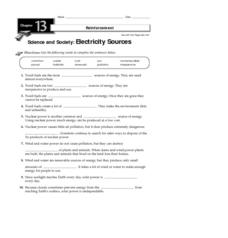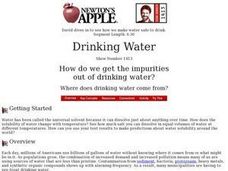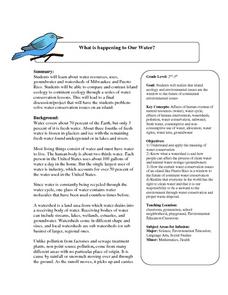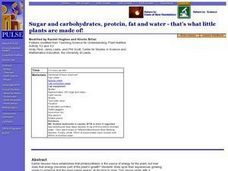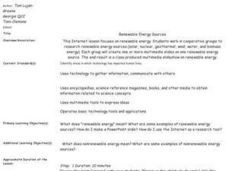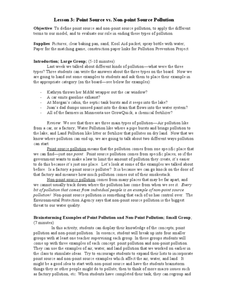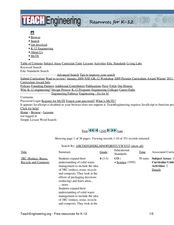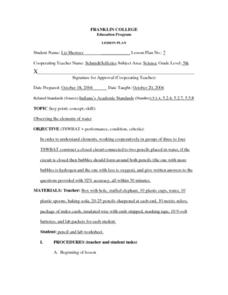Curated OER
Waves : An Alternative Energy Source
Students evaluate the feasibility of wave energy as an alternative source of energy. In this alternative energy source lesson students are introduced to renewable and nonrenewable energy and study energy production.
Curated OER
Electricity Sources
In this electricity worksheet, students review the different types of energy sources including fossil fuels, solar, wind, and nuclear energy. This worksheet has 10 fill in the blank questions.
Curated OER
Still Waters
Students construct a still to turn seawater into drinking water. They estimate the cost of distilling it. They investigate ways to make the conversion more efficient. They track the source of their home drinking water and make a map of...
Curated OER
What are rice farmers doing to help the environment with their water-filled rice fields?
Third graders research rice fields. In this rice fields lesson, 3rd graders discuss how fields contribute to the environment by providing an important food source for birds. They find the benefits of rice fields to water and soil as well.
Curated OER
Thermal Waters & Geologic Provinces
Students investigate thermal waters and geologic provinces. They examine provided maps of geothermal springs and thermal wells in the state of Idaho and their locations relative to Idaho's geologic provinces. Afterward, they use the maps...
Curated OER
A Hiking We Will Go
Students identify and describe examples of point source pollution. In this hiking lesson plan, students classify water pollution as either point source pollution or nonpoint source pollution. They listen to a story, take a walk around...
Curated OER
Water, Water Everywhere
Students observe and describe ways water is used in their homes and communities. They determine the source of their water. Students determine ways they can save and protect their water.
Curated OER
What is Happening to Our Water?
Young scholars compare and contrast Wisconsin's water resources to that of Puerto Rico. They research books about islands, particularly the Puerto Rican islands. Student view illustrations of island ecology. They discuss the...
Curated OER
Our Water Resources
Students build a model aquifer to study groundwater zones and water table formation. Students use the models to measure the movement of polluted groundwater.
Curated OER
Water Pollution Experiments
Fifth graders conduct experiments in simulated water pollution using a box of items to hold "pollutants"and an aquarium, representing a waterway. They observe how "rain" from a watering can poured into the box washes the pollutants into...
Curated OER
Sugar and carbohydrates, protein, fat and water - that's what little plants are made of!
Students identify photosynthesis as the mechanism by which plants convert sunlight energy into a usable energy source for plant processes. They identify photosynthesis as the mechanism by which plants create a molecule that can be used...
Curated OER
Alternative Energy Resources
In this alternative energy resources instructional activity, learners identify the ore that is commonly used in nuclear power plants and how it is processed. Then they determine the reaction that occurs when uranium atoms are split....
Curated OER
Water Pollution
Young scholars investigate a variety of pollutants that can affect water and the plants and animals that live in the water. In this water pollution lesson plan, students identify pollutants in a bog, marsh, stream or other wetland area...
Curated OER
Water Quest
Students visit the Hydrology Study Site, conduct a visual survey to discover info about local land use and water quality, and document their findings by mapping the water body. They use this investigation to raise questions for further...
Curated OER
Environment: Renewable Energy Sources
Students, in groups, conduct Internet research on various renewable energy sources. The groups create several multimedia slides for inclusion in a class presentation. Topics covered include solar, nuclear, and geothermal power.
Curated OER
Global Water
Students collect data on their household water use and calculate how many gallons of water a person uses per day. They investigate how students in different parts of the world get their drinking water.
Curated OER
Point Source vs. Non-point Source Pollution
Young scholars define and differentiate between point source and non-point source pollution. Students discuss various types of pollution including air, water and land pollution, analyze demonstrations and complete a worksheet.
Curated OER
Don't Water....Shed A Tear#145
Students examine the definition and attributes of tributaries and watersheds. They design a landscape which includes a mountain, a river, a lake and other appropriate items. They observe as the teacher pours water through the landscape...
Curated OER
Where's the Water?
Fifth graders conduct an investigation into water purification during a role play situation in an Amazon Rainforest. They design a scientific experiment for cleaning and filtering water.
Curated OER
How To Get Clear On Water
Tenth graders investigate different systems that are used to purify water. They have class discussion about the benefits and challenges that different countries would face with the implementation of the systems. Students explain the...
Curated OER
Observing the Elements of Water
Fifth graders conduct a closed circuit experiment to observe the elements of water. They discuss the elements of Hydrogen and Oxygen, and in small groups construct a closed circuit connected to two pencils placed in water. Students...
It's About Time
Volcanos and the Atmosphere
In the summer of 1815, snow fell every month in New England. Was this related to the volcanic eruption of Tambora in Indonesia earlier in the year? Young scientists design their own experiments to research the long-term effect a volcanic...
Concordia College Archives
Introduction and Student Inquiry
Introduce young musicians to the history of and different styles of music with an inquiry-based learning activity that asks them to play detectives to determine the similarities and differences among the sheet music found at a series of...
Consumers Energy
The Cost of Electricity
How much is your toaster costing you every day? Young environmentalists calculate the monetary costs of household appliances based on their average consumption of wattage.
Other popular searches
- Sources of Water Pollution
- Water Sources Grades K 2
- Water Sources K 2
- Activities on Water Sources
- Natural Water Sources
- Water Sources in Qatar
- Types of Water Sources
- Landforms Water Sources
- Sources of Water
- Streams as Water Sources
- Natural Sources of Water
- Water Sources in Drought



